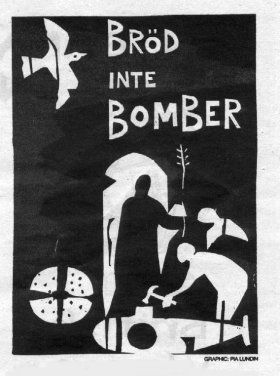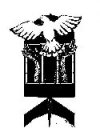
Bread Not Bombs Ploughshares Convicted
With the trial of the Loch Goil Three underway in Scotland, an English Crown Court in Preston, Lancashire, played host to Swedish disarmament activists Annika Spalde and Stellan Vinthagen. They returned to Great Britain in October for their second trial on a charge of conspiracy to commit criminal damage, for the Bread Not Bombs Plowshares action of September, 1998. Co-defendant Ann-Britt Sternfeldt was excused from court due to illness, and may face trial later. The group was jailed for more than six months between the action and their first trial last May, which ended with a hung jury.
The Swedish Plowshares group is informally associated with Trident Ploughshares 2000. They entered the shipyard in Barrow-in-Furness, England, while HMS Vengeance, the fourth and final British Trident submarine, was being completed.
They were caught before reaching the sub, but all three proudly proclaimed that their common purpose, planned together beforehand, was to damage the sub. They had tools with them to accomplish this, and written information outlining their plans.
They were also carrying loaves of bread, to be left as a symbol of what the money that is spent on Trident could otherwise be spent on.
On the eve of the trial, 70 peace activists from 14 countries around
the globe celebrated hope with the two defendants. The next morning a ritual
was established that was repeated each morning of the six day trial. Supporters
would gather at a local church hall, then process - sometimes in song,
sometimes to Buddhist drumming - single-file to Preston Crown Court, where
a circle for reflection would be held. A vigil and a rota for access that
day to the limited public gallery space in court would be established.

One day , the procession stopped at a large monument of four workers being shot down by British military during the General Strike of 1842. The killings happened while several thousand Preston workers were demonstrating against wage cuts and for the charter of democratic rights. Below the monument are the words with which Vera Baird, the barrister at the first Bread Not Bombs trial in June, closed the defense: "Remember, remember, people of proud Preston, that progress towards justice and democracy has not been achieved without great sacrifice. Remember, remember, people of proud Preston, to defend vigorously the rights given to you. Strive to enhance the rights of those who follow."
Judge and prosecution both acknowledged that the issue of international law and how it is to be considered were at the center of the trial. Crown prosecutors brought in an extra attorney to argue its irrelevance, and the judge ruled out it out as a defense.
The defendants were allowed ample opportunity as they took the dock on their own behalf, presenting powerful testimony born of their significant study of the issues of Trident and global justice, and a clarity of focus often revealed through the lens of imprisonment for the sake of conscience.
In closing statements, Spalde's attorney remarked on her evident good character, and reminded the jury only they had the power to make her a criminal or not. Vinthagen referred jurors to the breaking news that the Loch Goil Ploughshares had been acquitted, the Scottish judge having found the Ploughshares women's actions to be justified.
The jury broke from their deliberations mid-afternoon to declare that they could not reach a unanimous verdict. The judge then asked the jury if they could come to a 10-2 majority verdict. Jurors at the Bread Not Bombs Plowshares' first trial had been unable to muster such a majority, but this time the prosecution succeeded. Spalde and Vinthagen were convicted, 10-2. The judge stated that the six months the defendants had already served in jail before trial was "certainly long enough", and sentenced the two to time served.
